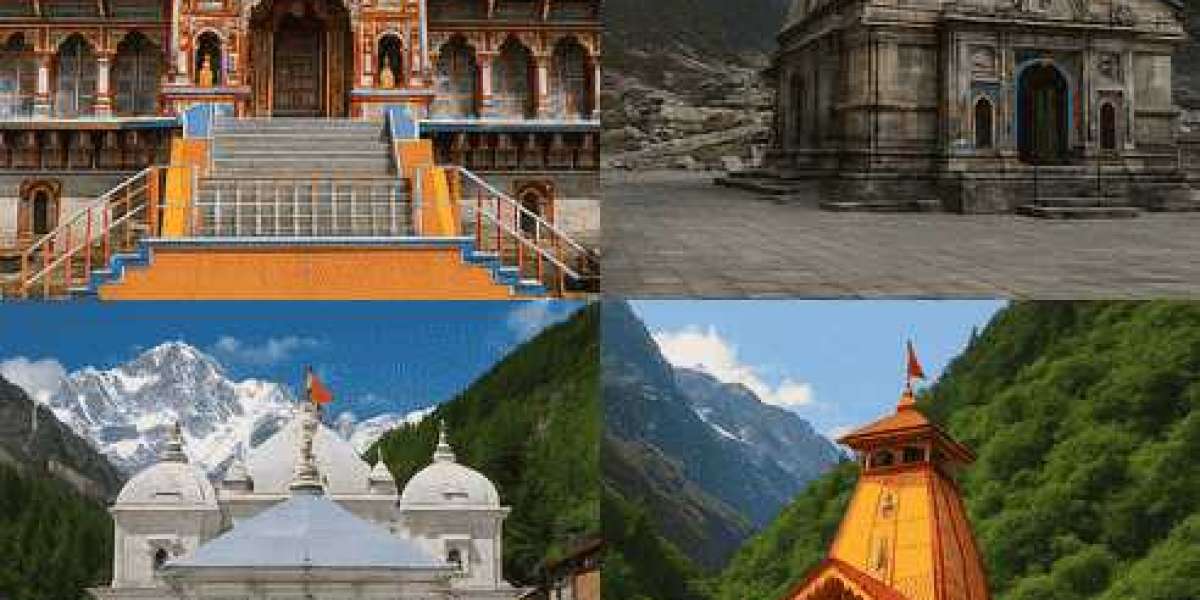The 4DhamYatra in Uttarakhand is one of the most sacred and spiritually significant pilgrimages in India. This revered journey covers four holy shrines nestled in the Himalayas — Yamunotri, Gangotri, Kedarnath, and Badrinath. Embarking on the Chardham Yatra not only brings religious fulfillment but also introduces you to the mesmerizing beauty of Uttarakhand’s mountainous terrain.
If you're planning this spiritual odyssey, this comprehensive step-by-step guide to 4DhamYatra will help you prepare efficiently and experience the pilgrimage with ease.
Step 1: Understand the Significance of the 4DhamYatra
The Chardham Yatra is believed to cleanse one's soul of all sins and is considered a path to moksha (liberation). Each of the four shrines holds unique spiritual importance:
Yamunotri – The origin of River Yamuna, dedicated to Goddess Yamuna.
Gangotri – The origin of River Ganga, dedicated to Goddess Ganga.
Kedarnath – A sacred Jyotirlinga of Lord Shiva nestled at a high altitude.
Badrinath – Dedicated to Lord Vishnu, located in the beautiful Alaknanda Valley.
Traditionally, the yatra begins from Yamunotri, followed by Gangotri, Kedarnath, and ends at Badrinath.
Step 2: Complete the Chardham Yatra Registration
Chardham Yatra Registration is mandatory for all pilgrims. You can register:
Online via the official Uttarakhand Government portal (https://registrationandtouristcare.uk.gov.in)
Offline at various registration counters set up across the state.
Make sure to carry valid ID proof and upload a passport-size photo during the process. Once registered, you’ll receive a QR code or e-pass which is required at each Dham checkpoint.
Step 3: Choose Your Mode of Travel
There are multiple ways to undertake the Chardham Yatra:
By Road: This is the traditional way and allows you to soak in scenic views along the journey. Most travelers begin from Haridwar, Rishikesh, or Dehradun.
Chardham Yatra by Helicopter: Ideal for those with time constraints or senior citizens, this option offers a comfortable and quick way to complete the yatra, typically in 2–5 days.
While Chardham Yatra by helicopter is more expensive, it saves travel time and physical strain, especially for Kedarnath, which involves a steep trek.
Step 4: Best Time to Visit Chardham Yatra
The best time to visit Chardham Yatra is from May to June and September to mid-October. Here's a breakdown:
May–June: Clear skies and pleasant temperatures make this the most popular time.
July–August: Monsoon brings landslides and heavy rainfall — not recommended.
September–October: Post-monsoon freshness and fewer crowds make this a good alternative window.
The temples usually open around Akshaya Tritiya (April/May) and close around Bhai Dooj (October/November). Always check the official opening and closing dates for the year you plan to travel.
Step 5: Know the Route and Itinerary
The ideal route for the 4DhamYatra is:
Yamunotri Dham (from Barkot)
6 km trek from Janki Chatti
Visit Yamuna Temple, Surya Kund, Divya Shila
Gangotri Dham (from Uttarkashi)
Accessible by road
Visit Ganga Temple, Bhagirath Shila, Pandav Gufa
Kedarnath Dham (from Guptkashi or Sonprayag)
16–18 km trek from Gaurikund
Visit Kedarnath Temple, Adi Shankaracharya Samadhi, Bhairavnath Temple
Badrinath Dham (from Joshimath)
Accessible by road
Visit Badrinath Temple, Tapt Kund, Mana Village, Vyas Gufa
Pro Tip: Keep at least 10–12 days for the full yatra by road. This allows for buffer time due to weather or road conditions.
Step 6: Prepare for the Journey
Health and Fitness:
Kedarnath requires high-altitude trekking, so start cardio workouts a month before.
Carry prescribed medications and a first-aid kit.
Packing Essentials:
Woolens, thermals, raincoat, trekking shoes
ID proofs, photocopies, power bank, flashlight
Dry snacks, reusable water bottle, ORS
Safety and Tips:
Stay hydrated, especially at high altitudes.
Avoid non-vegetarian food and alcohol during the yatra.
Travel in groups or with a local guide for added safety.
Keep emergency contacts and weather alerts handy.
Step 7: Understand the Chardham Yatra Cost
Chardham Yatra cost depends on the mode of travel, accommodation, and duration. A budget road trip could cost around ₹25,000–₹35,000 per person, while more comfortable or luxury tours may go up to ₹60,000 or more. Chardham Yatra by helicopter can cost ₹1.5 to ₹2 lakh per person depending on the provider.
Planning well in advance helps control costs and ensures availability during peak season.
Step 8: Accommodation and Food Options
You’ll find a wide range of stays — from basic dharamshalas to comfortable hotels in towns like Barkot, Uttarkashi, Guptkashi, Joshimath, and Pipalkoti. Most places offer pure vegetarian meals.
It is advisable to book your stays early via trusted platforms, especially during the peak months.
Conclusion
The 4DhamYatra is not just a religious journey; it’s a soul-stirring experience that tests your endurance and rewards you with spiritual serenity and breathtaking Himalayan views. With proper planning, timely Chardham Yatra registration, awareness of weather and travel options like Chardham Yatra by helicopter, you can make this holy trip safe, fulfilling, and memorable.
Whether you travel on foot, by vehicle, or take a helicopter route, the Char Dham Yatra promises to connect you deeply with the divine essence of India’s spiritual heritage. Plan wisely, travel respectfully, and let the mountains bless your journey.











